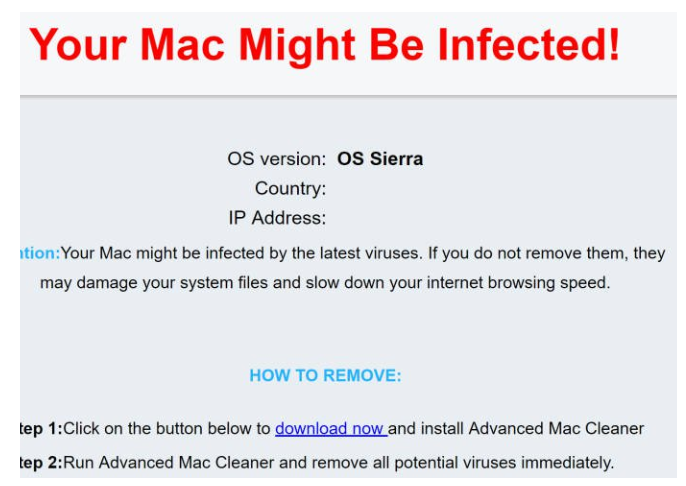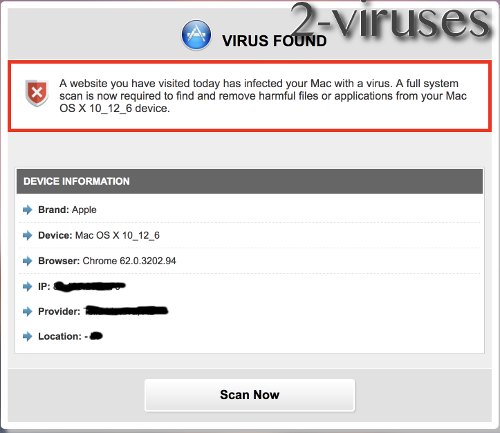

- #Get rid of advanced mac cleaner pop up verification
- #Get rid of advanced mac cleaner pop up password
- #Get rid of advanced mac cleaner pop up download
- #Get rid of advanced mac cleaner pop up free
This could help stop them from bugging your friends and family to download the app or join whatever service you’ve signed up for, he says. While you’re in your privacy settings center for your phone, consider blocking apps that don’t need your Contacts list from accessing it, suggests Brookman.

IPhone: Go to Settings > Privacy > Location Services > Turn off or adjust app by app.Īndroid: Go to Settings > Location > App location permissions > Turn off or adjust app by app. When it’s a must, let apps use your location data *only when you’re using them*, the Federal Trade Commission (FTC) recommends. “Geolocation can be incredibly revealing about potentially very sensitive things about your identity and what you do,” confirms Brookman, “and there are not a lot of protections or limitations on what can be done with it.” As a general rule, if it’s not clear how sharing your location will be useful to you, don’t give apps access to it, he says.
#Get rid of advanced mac cleaner pop up free
But many others don’t *need* the breadcrumbs they’re collecting on you, and they’re free to share and sell your each and every move to just about anyone. Some apps like Google Maps actually need your GPS location to function. Stop apps from tracking your location 24/7.
#Get rid of advanced mac cleaner pop up verification
two-step verification or multi-factor authentication). Other accounts: Setting up 2FA typically follows a similar process on other platforms like Mint, TikTok, Instagram, and Facebook: Head over to your security settings and follow the steps for 2FA (a.k.a. Tap “Turn on Two-Factor Authentication.”Īndroid and Google accounts: Follow these steps to turn on 2FA for all of your accounts at once.
#Get rid of advanced mac cleaner pop up password
IPhone and Apple accounts: Go to Settings > Password & Security. From there, prioritize any apps that contain special information about you such as your banking, budgeting, and social media accounts. It’s best practice to use 2FA for all of your accounts, but at the very least, make sure your email’s covered since it’s typically the first stop for confirming your identity and resetting passwords for other accounts, says Katie Skinner, head of privacy engineering at Apple. Two-factor authentication (2FA) is simply that extra step you take to keep your accounts secure by confirming it’s you when you log in via text or email. Add two-factor authentication to your most sensitive accounts. In this spirit, here are a few small ways you can begin to protect the intimate details of your online life.ġ. You have physical and sleep hygiene routines.so how about a privacy hygiene check? This can help you reflect on your current data situation and tighten your personal security, and it only takes a few minutes out of your day. However, he adds, “You should have reasonable expectations for your zone of privacy, for the things that you do that are not shared with the world.” When it comes to privacy settings, even security experts struggle to weigh what’s worth their effort and not, says Justin Brookman, director of technology policy for Consumer Reports, a nonprofit organization that advocates for a fair and just marketplace. ( Not meant to freak you out, simply to empower you to take action!)

But, like scheduling regular dental appointments, taking care of your digital well-being now and keeping an eye on new developments could help ward off unsettling possibilities in the future-like getting hacked or having information you thought was for your eyes only being shared with others. You’re in good company if upgrading your digital security is one of those things you suspect you ~should~ do but don’t.

Updating your privacy settings on your phone, laptop, and other devices is one way you can reduce the amount of data tech companies get on you, and the less they have, the better. They’re also a reflection of a deeper problem: Your data can be used in attempts to influence you every day, and that can feel like a Black Mirror-esque scenario you didn't necessarily say yes to. Targeted ads for whatever some algorithm thinks you need (but definitely don’t want) are annoying. Yet, many companies regularly collect and sell your data. You have an essential right to privacy on your phone, laptop, and other devices.


 0 kommentar(er)
0 kommentar(er)
